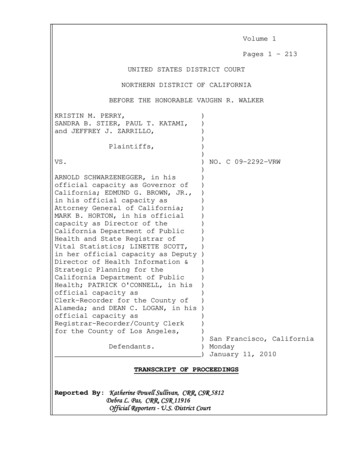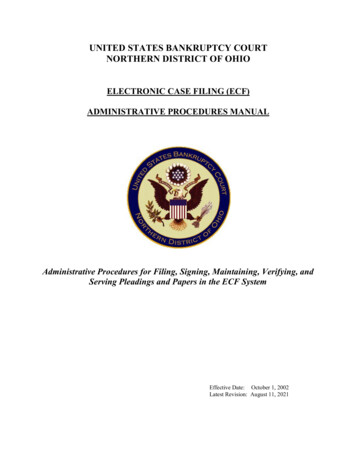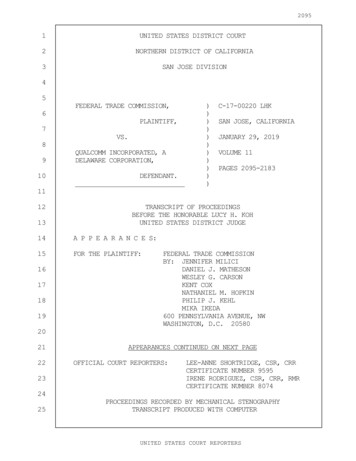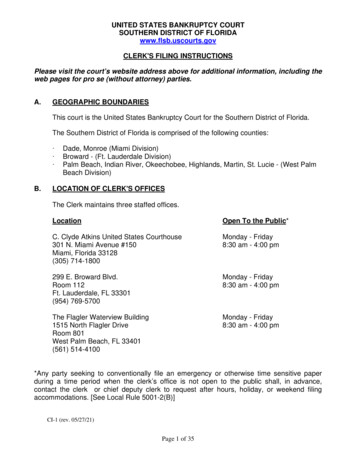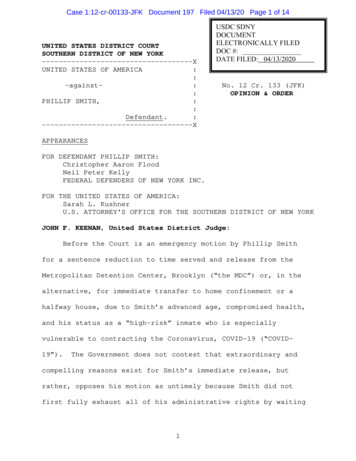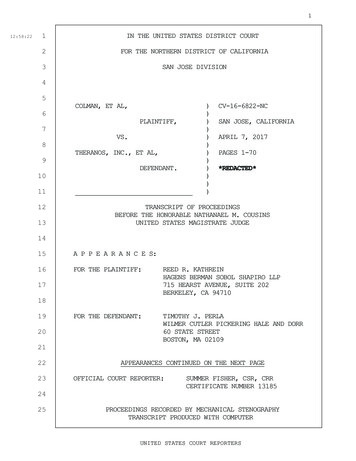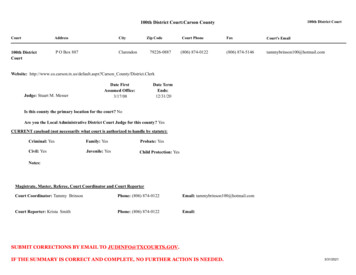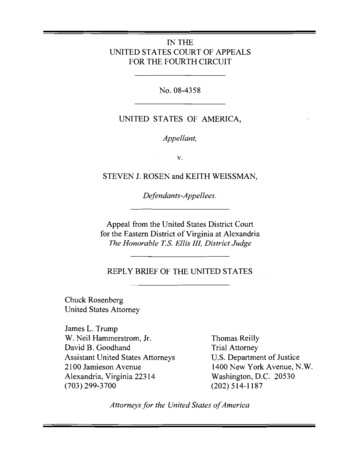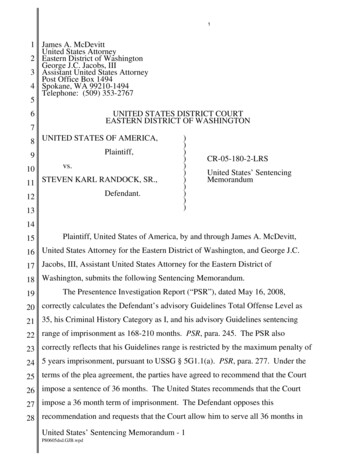
Transcription
Smith v. Warden Chillicothe Correctional InstitutionDoc. 13UNITED STATES DISTRICT COURTSOUTHERN DISTRICT OF OHIOEASTERN DIVISIONJOHN F. SMITH,CASE NO. 2:11-CV-00844JUDGE WATSONMAGISTRATE JUDGE ABELPetitioner,v.ROBIN KNAB, WARDEN,Respondent.OPINION AND ORDEROn June 28,2013, the Magistrate Judge issued a Report andRecommendation recommending that the instant petition for a writ of habeascorpus be dismissed. Petitioner has filed objections to the Magistrate Judge'sReport and Recommendation. For the reasons that follow, Petitioner's Objection,Doc. No. 12, is OVERRULED. The Report and Recommendation is ADOPTEDand AFFIRMED. This action is hereby DISMISSED.This case involves Petitioner's convictions after a jury trial on feloniousassault and involuntary manslaughter.The charges arose when Petitionerassaulted Bryan Biser, hitting him in the head with a closed fist. Biser, who wasdiabetic, died four days later. Petitioner asserts in these proceedings that he wasdenied effective assistance of counsel because his attorney failed to investigate,present evidence, and rebut testimony of the State's witnesses by showing thathe did not cause the victim's death and that Biser died because he failed toproperly care for his diabetes.Dockets.Justia.com
The state courts rejected Petitioner's claim, presented in post convictionproceedings, as barred under Ohio's doctrine of res judicata based onPetitioner's failure to raise the claim on direct appeal.The Magistrate Judgenonetheless addressed the merits of Petitioner's claim, because Petitionersupported his claim with evidence outside the record, but concluded thatPetitioner's claim lacked merit. Petitioner objects to this recommendation.Petitioner asserts that his attorney performed in an inadequate mannerunder the test set forth in Strickland v. Washington, 466 U.S. 668 (1984). Heargues that the state courts unreasonably applied federal law in denying hisclaim, as "no reasonable trial attorney would have failed to investigate and failedto present an expert witness to testify at Smith's trial regarding the victim'smetabolic state and mismanaged diabetes." Objection, PageiD #1218.Insupport of this claim, Petitioner submits an affidavit from Dr. Elena Christofides,who concluded that Biser's death was the result of his poor management of hisdiabetes. She testified his blood glucose level at the time of the assault wouldhave interfered with his brain function, regardless of the head injury caused bythe assault, and he overdosed on his insulin. Objection, PageiD# 1222. Further,Dr. Christofides concluded that the timing of Biser's death was inconsistent with afinding that his head injury was the proximate cause of his death.Petitionerasserts that he was prejudiced by his attorney's failure to call such an expertwitness to testify regarding the cause of death and argues Christofides testimonywould have exonerated him.Case No. 2:11-cv-844Page 2 of 8
Additionally, Petitioner objects to certain factual findings of the stateappellate court. Specifically, Petitioner refers to the following language of thestate appellate court's decision, indicating "[t]he defense expert was handicappedin making her analysis due to a lack of medical records and history of the victimscase . [S]he could not testify as an expert with any degree of medical certaintyor probability as to the cause of death. Also, defense counsel reasonably wouldnot want to risk a failure to qualify this witness to testify as an expert. That couldgreatly prejudice his case before the jury."Exhibit 27 to Return of Writ.Petitioner contends that these findings are unreasonable in view of the recordpresented, Objection, PageiD #1225-26, as Christofides reviewed the same oradditional evidence as Dr. Cox and concluded as to Biser's cause of death to areasonable degree of medical certainty.See Petitioner's Reply, Doc. No. 10,Exhibits 2-3. Finally, Petitioner argues that the Court should not give deferenceto defense counsel's failure to present expert testimony because defensecounsel failed to investigate.In short, Petitioner again asserts that, had hisattorney presented such expert testimony regarding the cause of death, there isa reasonable probability that he would have been acquitted.Pursuant to 28 U.S.C. § 636(b}, this Court has conducted a de novoreview.Upon review of the entire record, and for the reasons already welldetailed in the Magistrate Judge's Report and Recommendation, this Court is notpersuaded that Petitioner is entitled to relief. The standard of review in federalhabeas corpus proceedings provides that this Court cannot grant relief unless theCase No. 2:11-cv-844Page 3 of 8
state court's decision contravened or unreasonably applied federal law, or itsdecision was based on an unreasonable determination of the facts in light of theevidence presented. 28 U.S.C. § 2254(d), (e). Under this standard of review,"[a] state court's determination that a claim lacks merit precludes federal habeasrelief so long as '"fairminded jurists could disagree' on the correctness of thestate court's decision." Harrington v. Richter, -U.S.--, 131 S.Ct. 770, 786(2011) (quoting Yarborough v. Alvarado, 541 U.S. 652, 664 (2004 )). Such arethe circumstances here.As discussed by the Magistrate Judge, evidence indicated Biser had beenself-treating his diabetes without any known difficulties for an unknown period oftime, and he appeared to be healthy and functioning normally until the time of theassault.Dr. Trent, the deputy coroner, found that the cause of death washomicide due to blunt force craniocerebral injuries.Dr. Glenn Roush, aradiologiest, testified that Biser's April 19, 2005 CAT scan showed a skull fractureand recent brain injury. He had "never seen anyone with this sort of injury beable to function." Dr. William Cox, a forensic neuropathologist, testified that thecause of death was diabetic ketoacidosis and that the contusions to the frontallobes of Biser's brain affected his cognitive ability and substantially contributed tohis death because it clearly would have affected his ability to take care of himself.The state court's conclusion rejecting Petitioner's claim is supported bysubstantial evidence.Petitioner's Objection, Doc. No. 12, therefore is OVERRULED.Case No. 2:11-cv-844Page 4 of 8
Petitioner also seeks a certificate of appealability and requests to proceedin forma pauperis on appeal. When a claim has been denied on the merits, acertificate of appealability may issue only if the petitioner "has made a substantialshowing of the denial of a constitutional right." 28 U.S.C. § 2253(c)(2). Thisstandard is a codification of Barefoot v. Estelle, 463 U.S. 880 (1983). Slack v.McDaniel, 529 U.S. 473, 484. To make a substantial showing of the denial of aconstitutional right, a petitioner must showthat reasonable jurists could debate whether (or, for thatmatter, agree that) the petition should have beenresolved in a different manner or that the issuespresented were " 'adequate to deserve encouragementto proceed further.' " Barefoot, 463 U.S., at 893, and n.4./d. Petitioner meets this standard here. Petitioner's request for a certificate ofappealability is GRANTED. The following issue is certified for appeal:Was Petitioner denied effective assistance of counselunder the test set forth in Strickland?Because the filing fee assessment procedures prescribed by the PrisonLitigation Reform Act are not applicable to appeals taken in habeas corpusmatters, see Kincade v. Sparkman, 117 F.3d 949 (6th Cir.1997), the issue issimply whether petitioner can afford the 455.00 filing fee for an appeal.Federal Rule of Appellate Procedure 24(a) provides:(a) Leave to Proceed In Forma Pauperis.( 1) Motion in the District Court. Except as stated in Rule24(a)(3), a party to a district-court action who desires toCase No. 2:11-cv-844Page 5 of 8
appeal in forma pauperis must file a motion in thedistrict court. The party must attach an affidavit that:(A) shows in the detail prescribed by Form 4 of theAppendix of Forms the party's inability to pay or to givesecurity for fees and costs;(B) claims an entitlement to redress; and(C) states the issues that the party intends to present onappeal.(2) Action on the Motion. If the district court grants themotion, the party may proceed on appeal withoutprepaying or giving security for fees and costs, unless astatute provides otherwise. If the district court deniesthe motion, it must state its reasons in writing.(3) Prior Approval. A party who was permitted toproceed in forma pauperis in the district-court action, orwho was determined to be financially unable to obtainan adequate defense in a criminal case, may proceedon appeal in forma pauperis without furtherauthorization, unless:(A) the district court--before or after the notice of appealis filed--certifies that the appeal is not taken in goodfaith or finds that the party is not otherwise entitled toproceed in forma pauperis and states in writing itsreasons for the certification or finding; or(B) a statute provides otherwise.(4) Notice of District Court's Denial. The district clerkmust immediately notify the parties and the court ofappeals when the district court does any of thefollowing:(A) denies a motion to proceed on appeal in formapauperis;(B) certifies that the appeal is not taken in good faith; orCase No. 2:11-cv-844Page 6 of 8
(C) finds that the party is not otherwise entitled toproceed in forma pauperis.(5) Motion in the Court of Appeals. A party may file amotion to proceed on appeal in forma pauperis in thecourt of appeals within 30 days after service of thenotice prescribed in Rule 24(a)(4). The motion mustinclude a copy of the affidavit filed in the district courtand the district court's statement of reasons for itsaction. If no affidavit was filed in the district court, theparty must include the affidavit prescribed by Rule24(a)(1 ).(b) Leave to Proceed In Forma Pauperis on Appeal orReview of an Administrative-Agency Proceeding. Whenan appeal or review of a proceeding before anadministrative agency, board, commission, or officer(including for the purpose of this rule the United StatesTax Court) proceeds directly in a court of appeals, aparty may file in the court of appeals a motion for leaveto proceed on appeal in forma pauperis with an affidavitprescribed by Rule 24(a)(1 ).(c) Leave to Use Original Record. A party allowed toproceed on appeal in forma pauperis may request thatthe appeal be heard on the original record withoutreproducing any part.Petitioner is incarcerated but was not previously in this case grantedpauper status and has not submitted an affidavit of indigency in support of hisrequest. Therefore, Petitioner's request to proceed in forma pauperis is DENIEDwithout prejudice to renewal pending submission of an affidavit from the prisonwhere Petitioner is incarcerated of his prison trust account statement.The Report and Recommendation is ADOPTED and AFFIRMED.Thisaction is hereby DISMISSED.Case No. 2:11-cv-844Page 7 of 8
Petitioner's request for a certificate of appealability is GRANTED.IT IS SO ORDERED.MfCHAEL H. WATSON, JUDGEUNITED STATES DISTRICT COURTCase No. 2:11-cv-844Page 8 of 8
support of this claim, Petitioner submits an affidavit from Dr. Elena Christofides, who concluded that Biser's death was the result of his poor management of his diabetes. She testified his blood glucose level at the time of the assault would have interfered with his brain function, regardless of the head injury caused by
